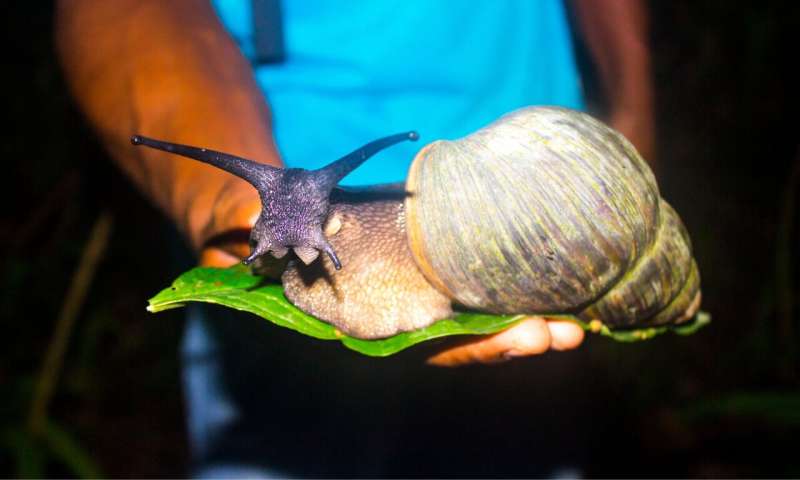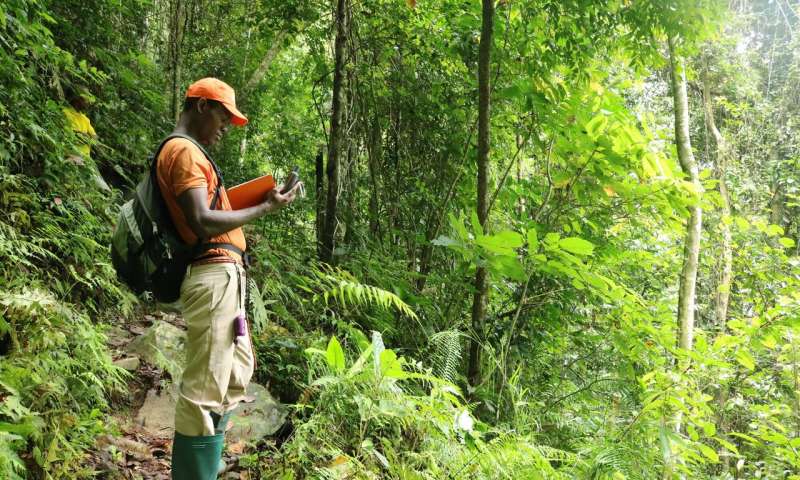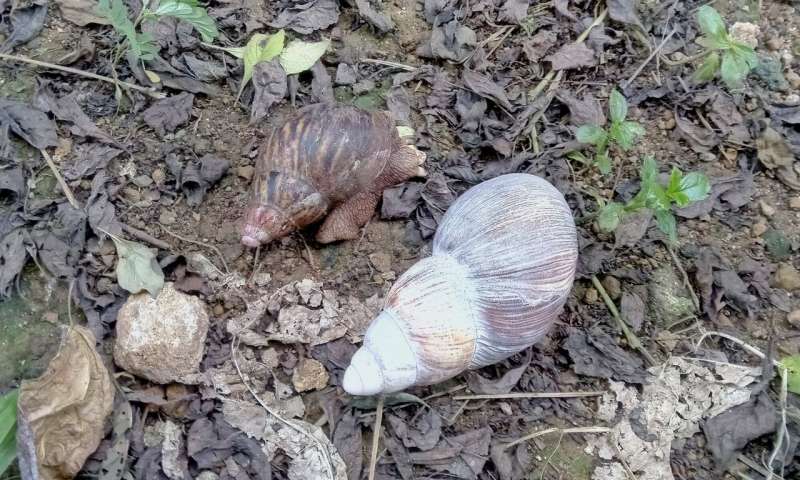Credit: Estrela Matilde/Fundação Príncipe
On the island of Príncipe a forest giant, known locally as the Obô snail, has undergone a population decline of more than 75 percent within the last 20 years and its range has decreased by approximately 40 percent, according to a recent report.
Príncipe lies in the Gulf of Guinea off the west coast of Africa and is the smaller of the two main islands that make up the nation of São Tomé and Príncipe. The island is a UNESCO Biosphere reserve, with much of its remaining native forest protected within the Parque Natural do Príncipe.
Between June 2018 and September 2019, a series of ecological and social surveys were carried out to find out more about the ecology of and threats facing Príncipe's bird and terrestrial mollusk species. The surveys were carried out by the NGO Fundação Príncipe, along with local eco-guides and national park technicians, with technical input provided by Fauna & Flora International.
The surveys also uncovered six mollusk species that are new to science and two new records for Príncipe, but 16 previously recorded mollusks were not found during this set of surveys.
Across the survey period, just 119 live individuals were recorded. Once occurring throughout much of Príncipe, the Obô snail is now found across approximately 46 km2, restricted to the protected forests in the south of the island. The species was still abundant during the 1990s, so it is likely that this decline has happened over the last 20 years.
Surveying on Príncipe. Credit: Yodiney dos Santos/Fundação Príncipe
Invasive issues
Similar in size to a croissant, the Obô snail (Archachatina bicarinata) is larger than its cousin, the West African giant land snail (Archachatina marginata), which was introduced to Príncipe in the 1980s and quickly spread across much of the inhabited north of the island. At the same time, the Obô snail declined in this area, retreating south. Competition with the West African snail for resources and the introduction of disease are among the potential reasons for this shift.
Off the menu
Historical collection by people is another likely reason for the sharp drop in Príncipe's Obô snail population. Interviewees reported that it was previously possible to harvest 450 of the snails every month, but now collection is more difficult and reaches up to 30-40 per month.
Despite being a more popular choice for collectors, due to its greater size, superior flavor and use in traditional medicine, the Obô snail is no longer regularly harvested because of the longer distances required to travel in order to find it and the low numbers available. The West African snail has now become an important source of food and income for rural communities and is also in demand from international exporters.
The West African giant land snail (left) is smaller than its cousin, the Obô snail (right). Credit: Credit: Frazer Sinclair/Fundação Príncipe
Turning the tide
Information from these recent surveys will be used to update the Obô snail's status on the IUCN Red List, which was last assessed 20 years ago and is in urgent need of an update as the species' current classification as Vulnerable no longer reflects the situation on the ground.
Plans to develop a formal conservation action plan for the Obô snail commenced in October with workshops held in both Príncipe and São Tomé – where the species also occurs and is experiencing similar, but less severe, declines. Fundação Príncipe's work to conserve the Obô snail has been made possible thanks to financial support from Le Fonds Français pour l'Environnement Mondial, the Critical Ecosystem Partnership Fund and HBD Príncipe. Actions across the two islands are being coordinated in partnership with researchers from the Forest Giants Project, Alisei and Lisbon University.
The value of the Parque Natural do Príncipe should not be underplayed—it provides a refuge for the Obô snail, and five of the six newly discovered mollusks were found to occur only within its boundaries, suggesting that it plays a significant role in their conservation. Príncipe's forests are integral to the island's communities, with collecting of fruit and firewood and timber extraction all of vital importance. Growing demand for these forest resources is piling further pressure on the Obô snail and other threatened species on Príncipe that rely on native forest habitat. Additional social surveys to better understand the extent of forest resource use by local communities would be useful for informing the park's future conservation management.
Provided by Fauna & Flora International

























